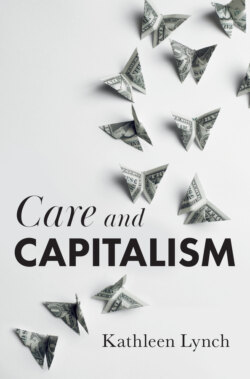Читать книгу Care and Capitalism - Kathleen Lynch - Страница 37
The gender order of caring in families
ОглавлениеWhile the heterosexual household is a contested family formation, it remains the modal form of family organization. Within all types of families, there is an internal economy within and through which household goods and services are produced: food is prepared and cooked, floors are cleaned, toilets are washed, family events are organized and so forth (Folbre 1994). The relations of production, consumption and the transmission of goods within families operate by different rules of exchange from market production; they are differentiated by age and marital status, and especially by gender, where heterosexual couples are involved (Delphy and Leonard 1992). While there have been changes since the early 1980s, and men now do more childcare and more housework than several decades ago, on average, US data show that wives do 1.7 times the housework of husbands, while married mothers average 1.9 times as much housework as married fathers (Bianchi, Sayer, Milkie and Robinson 2012). Although there are changes in the amount of time men spend in certain areas of childcare when both partners are employed full time, notwithstanding this, a US study spanning the years 2003–7, involving over 13,000 women and men, found mothers’ time in childcare always exceeded fathers’ time, although the gender gap is narrower in dual-earner families (Raley, Bianchi and Wang 2012: 1440).10 The pattern is similar across Europe and nearby countries; while women do much more care work and housework in Greece and Turkey than in Sweden and Norway, the gender disparities remain even within these.11 Even in the Nordic countries (Sweden, Norway, Finland, Denmark and Iceland), where there are enhanced childcare supports and extensive paid parental leave for both parents, men remain reluctant to take the full leave available, and where the leave can be shared between mothers and fathers, mothers are far more likely to take it (Cederström 2019). Undertaking hands-on primary caring is not central to men’s identity as men (Hanlon 2012). The gendered male order impacts on men, even in the more gender-egalitarian Nordic states, with men fearing that their managers and co-workers might judge them adversely if they took longer and more optional care leave; they fear they would suffer career penalties (Cederström 2019: 40).
The unequal gender division of both domestic and care labour benefits men individually (Connell 1995: 67–86), as women’s unwaged care and domestic labour frees men up to take public power in an hierarchically ordered economy and society. Men can use their power relative to their class and racial position in ways that involve exercising control over women (Badgett and Folbre 1999; Folbre 2012). The unequal division of care and domestic labour also impoverishes women, especially working-class and poor women, not only in the present but in future time, particularly in old age, due to their lack of economic independence and pension entitlements (Oxfam 2020).
Without recognizing the unique and highly unequal gendered dynamics of household economies, work organizations and the state itself, and the materialist gains that ensue for men of all classes from these, there is misrecognition of the interests of men, qua men, in upholding a capitalist system from which they are net beneficiaries relative to women of their class.
While patriarchy has long historical roots predating capitalism, capitalism has reinforced, legitimated and consolidated a value order in which there is a deep disassociation of value between female-dominated caring labour and market labour. Neoliberal-led globalization has exacerbated that value divide by making the chains of connectedness invisible. It has widened the physical and mental distances between provisioning and consumption, as most are ignorant of the exploitations and abuses that often underpin the food they eat, the clothes they wear or the phones and laptops they use to communicate (Federici 2019: 109–10). The foundational work that is required to care for the Earth, prevent suffering and produce humanity itself in non-exploitative relations is unnamed and unspoken (Mies and Bennholdt-Thomsen 2000; Federici 2019).
